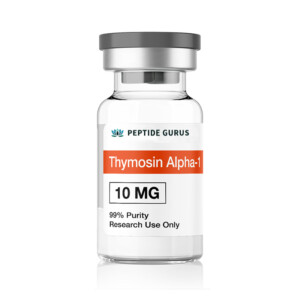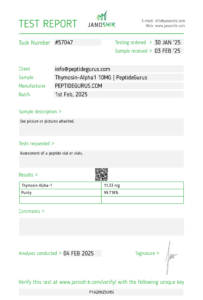Thymosin Alpha – 1 (Tα1) is a peptide that has drawn significant attention in the field of medical research, particularly in cancer treatment. Naturally occurring in the thymus, this peptide has been studied for its ability to modify, enhance, and restore immune function, which makes it a potential candidate for cancer therapies.
Tα1 is a small molecule polypeptide consisting of 28 amino acids, weighing approximately 3.1 kDa. It acts through toll – like receptors (TLR 2 and TLR 9) in myeloid and plasmacytoid dendritic cells (DCs). By interacting with these receptors, Tα1 triggers a series of events. It leads to the activation and differentiation of DCs and T cells. Additionally, it initiates the production of cytokines such as interferon – gamma (IFN – γ) and interleukin – 2 (IL – 2), which are crucial for a healthy immune response.
Potential in Cancer Treatment Research
Immune System Modulation
In cancer, the immune system often fails to recognize and destroy cancer cells effectively. Thymosin Alpha – 1 has the potential to modulate the immune system in several ways. It can enhance the function of T cells, which are key players in the body’s defense against abnormal cells, including cancer cells. Some T cells are responsible for directly killing cancerous cells, while helper T cells work with other immune cells to coordinate an appropriate immune response. By increasing the number and activity of T cells, Tα1 may help the immune system better target and eliminate cancer cells.
Moreover, Tα1 can promote the activation and maturation of dendritic cells. Dendritic cells are like the “scouts” of the immune system. They capture and present antigens (substances that can trigger an immune response, such as those from cancer cells) to T cells, thereby initiating an immune attack. A more efficient dendritic cell function, as promoted by Tα1, can lead to a stronger and more targeted anti – cancer immune response.
Antitumor Activity
Research has shown that Tα1 may have direct antitumor effects. In some tumor xenograft models, such as the 4T1 and B16F10 models, Tα1 has been observed to display antitumor activity. It can upregulate the expression of CD86, a protein on the surface of immune cells that plays a role in activating T cells. Additionally, it promotes the secretion of IFN – γ and IL – 2, which have antiviral and antitumor properties. Tα1 also increases the number of tumor – infiltrating CD4+ T and CD8+ T cells. These cells can directly attack cancer cells within the tumor microenvironment, potentially slowing down or even reversing tumor growth.
FDA Guidelines and Considerations
Approval Process
The FDA has a rigorous approval process for any drug or peptide, including Thymosin Alpha – 1, especially when it comes to cancer treatment. Before Tα1 can be widely used as a cancer therapy, extensive pre – clinical and clinical trials are required. Pre – clinical trials typically involve laboratory and animal studies to assess the safety and potential efficacy of the peptide. This includes determining the appropriate dosage, understanding how the body processes the peptide, and identifying any potential side effects.
Clinical trials, on the other hand, are conducted on humans. These trials are divided into several phases. Phase I trials focus on safety, determining the maximum tolerated dose in humans. Phase II trials evaluate the effectiveness of the treatment in a small group of patients, while Phase III trials involve a larger number of patients and compare the new treatment (Tα1 in this case) with existing standard treatments. Only after successful completion of these trials and meeting the FDA’s strict criteria can a drug or peptide be approved for cancer treatment.
Safety and Efficacy Monitoring
Even after approval, the FDA continues to monitor the safety and efficacy of drugs. For Thymosin Alpha – 1, any new or unexpected side effects that emerge during post – approval use need to be reported. Additionally, long – term studies may be required to assess the durability of the treatment’s effectiveness in cancer patients. The FDA also ensures that the manufacturing process of Tα1 products remains consistent and meets high – quality standards to guarantee the safety and potency of the peptide.
Product – Specific Information
Our Thymosin Alpha – 1 product, available in a 10mg form, is carefully formulated to ensure its quality and effectiveness. It is important to note that this product should only be used under the supervision of a qualified healthcare professional, especially in the context of cancer treatment, which is a complex and serious medical condition.
Proper storage is crucial to maintain the stability of Thymosin Alpha – 1. It should be stored as per the recommended storage conditions, typically in a cool, dry place, away from direct sunlight and extreme temperatures. Following these storage guidelines helps to preserve the peptide’s structure and function, ensuring that it remains effective when used.
Common Questions and Answers
Question 1: Can Thymosin Alpha – 1 cure cancer on its own?
Answer: Currently, there is no evidence to suggest that Thymosin Alpha – 1 can completely cure cancer on its own. Cancer is a complex disease with multiple factors contributing to its development and progression. While Tα1 shows potential in modulating the immune system to target cancer cells, it is usually considered as part of a comprehensive cancer treatment plan. This may include surgery, chemotherapy, radiation therapy, or other immunotherapies. Tα1 may enhance the effectiveness of these existing treatments by boosting the immune response, but it is not a standalone cure.
Question 2: Are there any side effects of using Thymosin Alpha – 1 for cancer treatment?
Answer: In general, Thymosin Alpha – 1 has a relatively good safety profile. However, like any medical treatment, it can have some side effects. In some cases, patients may experience mild injection – site reactions such as pain, redness, or swelling. There may also be some systemic effects, although they are less common. These could include mild flu – like symptoms such as fever, fatigue, or muscle aches. Since Tα1 modulates the immune system, there is also a theoretical risk of over – stimulating the immune system, which could potentially lead to autoimmune – like reactions. But overall, the incidence of severe side effects is relatively low. It’s important to note that individual responses may vary, and a healthcare provider should be consulted for personalized advice.
Answer: Other cancer immunotherapies, such as checkpoint inhibitors and CAR – T cell therapies, work through different mechanisms. Checkpoint inhibitors block proteins that cancer cells use to avoid immune detection, while CAR – T cell therapies involve modifying a patient’s own T cells to better target cancer cells. Thymosin Alpha – 1, on the other hand, focuses on enhancing the natural immune response by activating T cells and dendritic cells. One advantage of Tα1 is its relatively mild side – effect profile compared to some other immunotherapies, which can have severe and sometimes life – threatening side effects. Additionally, Tα1 may be more widely applicable as it can be used in combination with various other cancer treatments. However, more research is needed to directly compare its effectiveness with other immunotherapies in different types of cancer.

